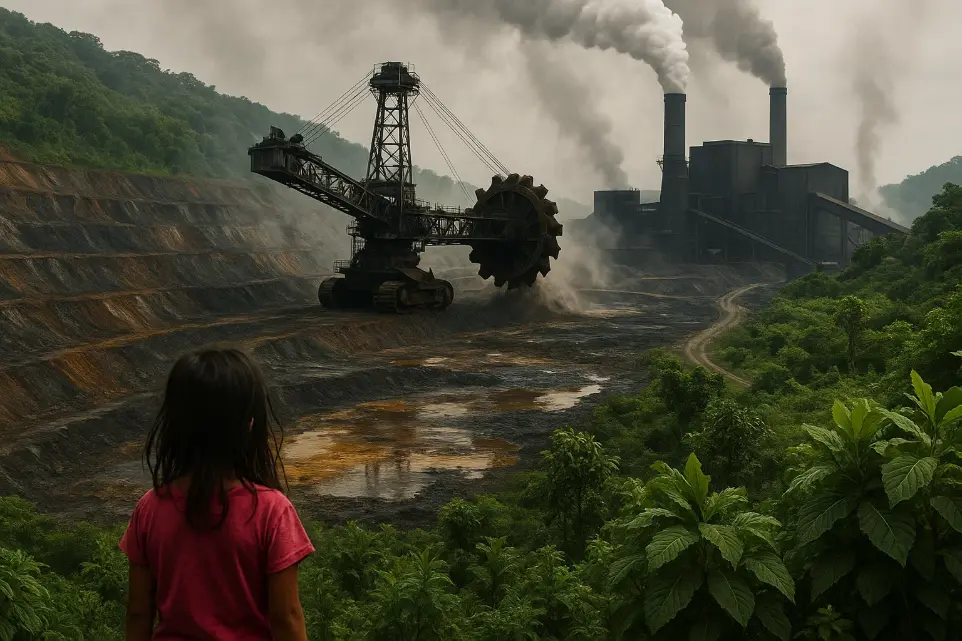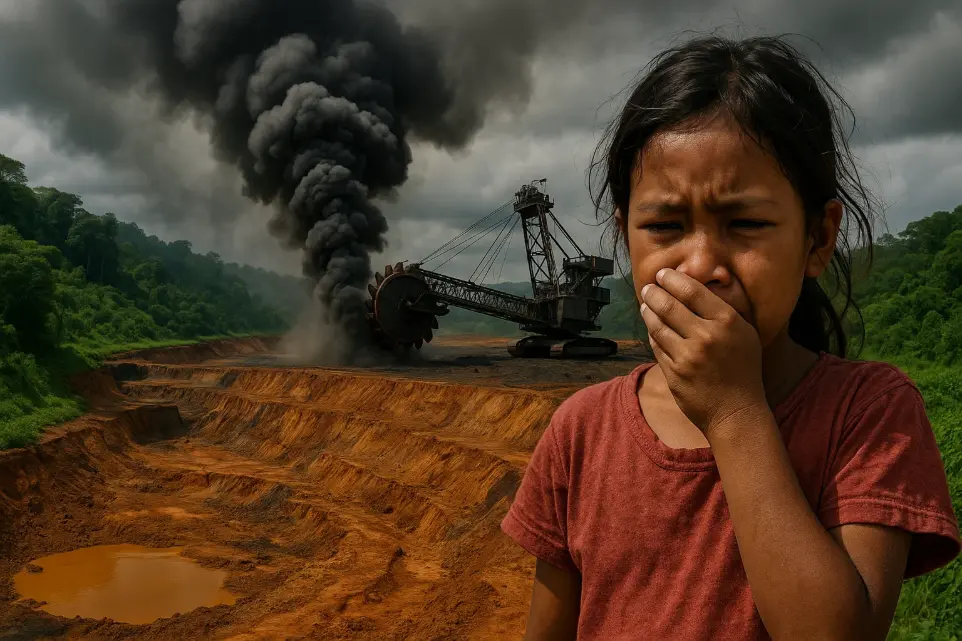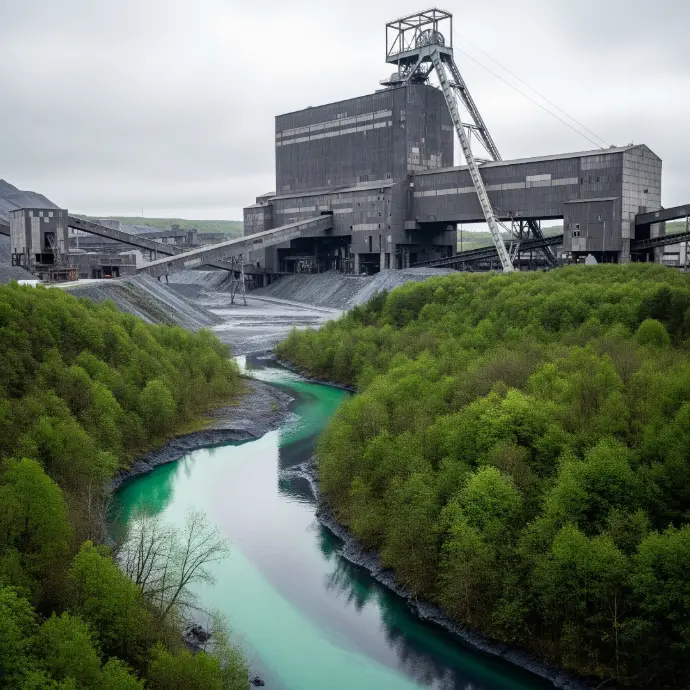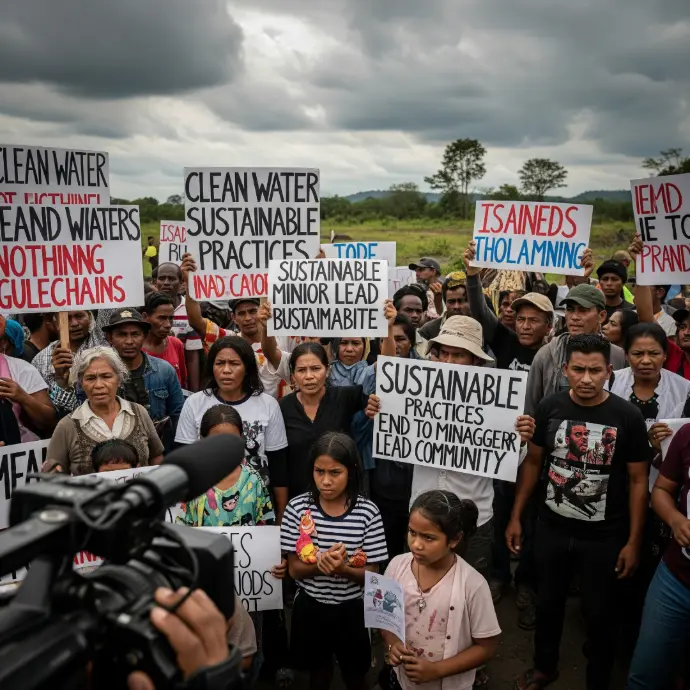The Silence of Lead:
Impact of Mining Pollution
on the Fundamental Right to Health
Mining, although considered an essential activity for the economic development of many countries, has generated profound and worrying effects on the environment and the health of communities near these extractive projects. One of the most alarming problems is lead contamination, a heavy metal whose presence in the environment poses a serious threat to the quality of life of thousands of people, especially the most vulnerable populations, such as children and pregnant women.
The toxic nature of lead makes it a silent enemy that gradually infiltrates human bodies through contaminated air, water, and food. Prolonged exposure is linked to a range of health problems ranging from delayed cognitive development and neurological disorders to kidney and cardiovascular disease. Despite the magnitude of this health risk, many governments and mining companies remain in a worrying state of inaction or, worse still, cover-up, prioritizing economic profits over the fundamental rights of affected communities.
In many mining areas, this environmental poisoning is ignored or minimized under a veil of misinformation and lack of transparency. Studies on the dispersion of lead in the environment are often scarce or insufficiently disseminated, leaving exposed communities without effective mechanisms for protection or means to demand justice. The struggle to guarantee the right to a healthy and safe environment, closely linked to the right to health, is fraught with legal, political, and social obstacles.
However, the impact of lead goes beyond medical indicators or environmental contamination maps; it also undermines human dignity and perpetuates cycles of poverty and marginalization. Families living near mining operations face a daily struggle not only against the physical consequences of lead poisoning, but also against a system that does not always recognize or respond to their suffering.
Faced with this situation, it is imperative to rethink our priorities as a society. Public policies must focus on mitigating the environmental damage caused by extractive industries while strengthening epidemiological surveillance systems, access to adequate medical treatment, and effective environmental remediation processes. At the same time, it is necessary to encourage the active participation of affected communities in decisions related to their environment and guarantee them access to clear and accurate information about the impacts they face.
The silence surrounding lead must not prevail. Breaking this barrier implies recognizing the historical debt that both governments and companies owe to those who have been forced to live amidst contamination and neglect. Only then will it be possible to move toward a future where the balance between economic development and respect for human life ceases to be a distant ideal and becomes a tangible reality.
Introduction
Pollution from mining activities has a significant impact on human rights, particularly for communities living near mining sites. Emissions of harmful substances and waste generated by mining can contaminate the air, water, and land, impacting the health, access to drinking water, and livelihoods of these communities. Furthermore, exposure to heavy metals and hazardous chemical compounds can trigger chronic health problems, such as respiratory diseases, skin conditions, and neurological disorders.
Mining pollution can also negatively impact the cultural and property rights of Indigenous Peoples, as environmental degradation can directly impact their traditional practices, their relationship with their land, and their cultural heritage. It is essential to address this issue from a human rights perspective, ensuring that affected communities have active participation in the decision-making process and that their rights to a clean environment, health, and a dignified existence are recognized.
The problem of mining pollution and its impact on human rights is not a recent issue. Throughout history, numerous incidents have been documented in which entire communities have suffered the consequences of uncontrolled and polluting mining. From toxic waste dumps to the ongoing contamination of water and land, the background to this situation is alarming.
On numerous occasions, affected communities have tried to make this problem visible and demand respect for their rights. However, the absence of adequate regulations and mechanisms that can hold mining companies accountable has perpetuated this situation, giving rise to a cycle of injustice and abuse of authority.
It is essential to understand the background of this issue in order to implement timely measures that safeguard the human rights of communities affected by mining pollution.
In response to the problem of mining pollution, regulations and legal frameworks have been implemented at both the national and international levels to protect the human rights of impacted communities. These legal frameworks address issues such as mining waste management, water conservation, citizen participation in environmental decisions, and corporate responsibility regarding human rights.
For example, the United Nations Declaration on the Rights of Indigenous Peoples and ILO Convention 169 recognize the rights of indigenous communities to their territories and resources, as well as their right to prior and informed consultation regarding any action that may affect their well-being.
Globally, different nations have established legal frameworks that govern mining operations and establish environmental and social standards that companies must comply with. However, the effectiveness of these regulations varies significantly between countries, and in many cases, deficiencies in their implementation and enforcement remain.


Mining Pollution and Its Impact on Human Health
Pollution generated by mining directly affects the health of populations living near extraction areas. Emissions of dust and toxic substances released by mines can trigger respiratory illnesses, including asthma, chronic bronchitis, and pneumonia. Furthermore, exposure to heavy metals such as lead, mercury, and arsenic has the potential to damage the nervous system, cause kidney problems, lead to developmental disorders in children, and even increase the risk of developing cancer.
The inhabitants of these communities suffer a decline in their quality of life, which has significant effects on both their physical and mental well-being. Prolonged exposure to mining pollution can induce stress, anxiety, and depression, adversely affecting the psychological health of the affected population.
It is essential to conduct epidemiological investigations in these locations to fully understand the long-term impacts of mining pollution on community health, thus facilitating the implementation of preventive and corrective measures.
Water pollution from mining activities poses a serious threat to the health of neighboring communities. Toxic waste and chemicals used in mineral extraction can infiltrate local water resources, contaminating rivers, streams, and aquifers used for human consumption and agricultural activities.
Consuming water contaminated with heavy metals and toxic substances can cause poisoning, gastrointestinal illnesses, liver and kidney damage, and endocrine system disruption. These consequences are particularly severe for children and pregnant women, who are more vulnerable to the harmful effects of water pollution.
The lack of access to clean and safe water caused by mining pollution constitutes a violation of the human right to water and sanitation, which exacerbates the vulnerability of impacted communities.
Employees in the mining industry face significant health risks as a result of exposure to dust, gases, chemicals, and high levels of noise in the workplace. Inhalation of silica dust can induce serious lung diseases such as silicosis, while contact with harmful chemicals can cause damage to the respiratory system and other organs.
Additionally, mining workers are exposed to physical hazards such as tunnel collapses, cave-ins, explosions, and accidents involving heavy machinery, which increases the risk of severe injuries and even fatalities. It is essential that mining companies adhere to rigorous occupational health and safety regulations to safeguard the physical health and well-being of their employees, ensuring safe working environments and the availability of adequate personal protective equipment.
Mining-related pollution not only causes severe damage to the physical health of surrounding communities but also significantly impacts their mental health. People living in proximity to contaminated mines often suffer high levels of stress, anxiety, and depression due to uncertainties related to the long-term impacts on their health and that of their families. Constant concern about water, soil, and air contamination, along with the fear of developing serious illnesses, negatively impacts the mental health of these groups.
Additionally, mining pollution can lead to social conflict within communities, as tensions rise due to the lack of uncontaminated natural resources and disputes over compensation and accountability for damages caused. The psychological impact of living in an environment constantly affected by pollution can also manifest itself in an increase in domestic violence, substance abuse, and other behaviors harmful to mental health.
Both authorities and mining companies have an obligation not only to address the physical consequences of pollution but also to offer psychological and social support to the resulting communities. It is crucial to implement mental health initiatives and facilitate access to psychological support services to help reduce the emotional impact caused by mining pollution and promote the overall well-being of those affected.

Right to a Healthy and Sustainable Environment
Pollution generated by mining operations is a global concern, as it can have a significant impact on the environment and the health of nearby communities. For this reason, there are international regulations aimed at controlling and managing this issue, thus ensuring access to a healthy and sustainable environment for the entire population.
The United Nations Convention on the Law of the Sea, the Basel Convention on the Control of Transboundary Movements of Hazardous Wastes and Their Disposal, and the Stockholm Convention on Persistent Organic Substances are examples of international treaties that address pollution resulting from mining and its environmental impacts. These pacts seek to regulate the management of toxic waste, monitor pollution in seas and oceans, and minimize the release of harmful chemicals, with the goal of safeguarding human health and the environment.
Additionally, the Rio Declaration on Environment and Development, as well as the Sustainable Development Goals of the 2030 Agenda, underscore the importance of protecting the environment and promoting sustainable development, which implies defending against pollution caused by mining.
In response to the adverse effects of mining pollution on human rights, a diverse number of human rights organizations and defenders have taken legal action to safeguard affected communities. These initiatives range from filing lawsuits to promoting national laws that ensure the right to a healthy environment.
The Inter-American Court of Human Rights and the Supreme Court of Argentina have issued rulings recognizing the right to a healthy environment and ordering the remediation of areas impacted by mining pollution. These judicial rulings set a significant precedent in the defense of human rights in the face of pollution caused by mining.
Likewise, the work of non-governmental organizations and social movements has been crucial in protecting human rights in the face of mining pollution, promoting citizen participation in decision-making, and demanding accountability from mining companies and governments.
Companies involved in mining have an obligation to ensure that their operations do not harm the environment or public health. This involves adopting measures to prevent pollution, properly managing mining waste, and complying with current environmental regulations.
The implementation of sustainable mining methods, conducting environmental impact analyses, and clearly communicating ecological risks are essential elements of corporate responsibility in the mining sector. Likewise, collaborating with local populations and adopting participatory methods in the decision-making process can help reduce the adverse effects of mining. When violations of environmental regulations or human rights violations are detected, mining companies have an obligation to acknowledge their responsibility, rectify the damage caused, and offer compensation to the affected communities. Accountability is a fundamental factor in safeguarding the environment and human rights in the mining sector.

Social Conflicts and Human Rights in Mining Areas
Mining activity not only harms the ecological environment but also directly impacts community life and interactions between individuals in the areas adjacent to mines. The existence of mining operations can cause tensions and disputes among local residents, as these activities often significantly impact the well-being of local communities. Pollution of water, air, and soil resources, along with constant noise and landscape disturbance, can cause friction between residents and mining companies, resulting in social tensions that impact interpersonal relationships within the community.
Furthermore, mining activity often involves the arrival of outside workers, which can disrupt the demographic and sociocultural balance of the region. This can lead to clashes with the local population as well as tensions between traditional inhabitants and newcomers, thus complicating social dynamics in these areas.
Pollution caused by mining not only affects the natural environment but also causes social conflicts and disrupts relationships between people living near mines, highlighting the interrelationship between the environment, society, and human rights.
On numerous occasions, mining activities have been linked to the forced displacement of entire communities, as well as to the loss of territories and the disruption of ways of life. Large-scale mining operations generally require vast areas of land, which can result in the forced relocation of communities that have inhabited those lands for generations.
Forced displacement has a devastating effect on the lives of affected individuals and communities and can generate numerous additional challenges, such as the loss of cultural identity, difficulties in accessing natural resources, and the disruption of social support networks. Furthermore, this forced relocation can exacerbate the poverty and marginalization of the communities involved, thus increasing their vulnerability and restricting their access to fundamental rights, including the right to health.
The loss of territory and forced displacement resulting from mining activities raise serious human rights concerns and highlight the need to comprehensively address the social impact of mining to safeguard the rights of affected communities.
In numerous settings, mineral exploitation has been linked to human rights violations, including the repression of freedom of expression and assembly, as well as the use of violence by authorities or companies to silence opposition to mining projects. Human rights activists, environmental defenders, and community leaders who oppose mining activities frequently face threats, harassment, and even assault, compromising their safety and freedom.
Furthermore, conflict situations related to mining can intensify militarization in affected areas, which in turn can result in an increase in the presence of security forces and their interactions with the civilian population. This can lead to abuses of power, human rights violations, and an environment of fear and insecurity in the communities involved.
Human rights violations in mining conflict situations are a major concern for social justice and fundamental rights, and highlight the need to ensure the protection of human rights defenders and to comprehensively address the social impacts of mining activities on affected communities.
Challenges and Future Outlook
Currently, the mining industry faces the challenge of reducing its ecological footprint, focusing particularly on soil, water, and air pollution. To address this issue, technological advances are being developed that attempt to reduce the release of harmful substances and the creation of hazardous waste from mining activities.
Emerging technologies include wastewater recycling systems, the use of biotechnology to remediate contaminated soils, and the adoption of more efficient extraction and purification methods. These innovations offer significant progress in reducing mining-related pollution and preserving the environment.
Furthermore, it is imperative that mining companies dedicate resources to adopting these technologies and commit to implementing sustainable practices that reduce their environmental impact and respect the rights of surrounding communities.
The active participation and empowerment of communities impacted by mining-related pollution are essential elements to ensure the protection of human rights in these settings. Local communities must be included in the decisions that determine their environment, and their participation in decision-making is critical to achieving sustainable and equitable development.
It is essential that mining companies consult and collaborate closely with local communities, honoring their ancestral knowledge and rights to their territories. The creation of participatory mechanisms, such as public hearings and prior consultations with adequate information, is crucial to ensure that affected communities can express their concerns and collaborate in the search for joint solutions.
Additionally, community strengthening and the promotion of local development projects are essential to empower communities and improve their negotiating capacity with mining companies and government authorities.
Effective regulation and oversight of the mining sector are key to safeguarding human rights in this context. Government authorities need to strengthen the legal framework and their oversight capacity to prevent and punish environmental pollution and its adverse effects on community health.
The creation of laws and policies that define rigorous environmental and social standards, along with the implementation of strict monitoring and enforcement mechanisms, are fundamental steps to ensure that mining companies operate responsibly and respect human rights.
Likewise, it is essential to promote clarity and access to data related to mining activities, as well as to incentivize the accountability of companies that do not adhere to current regulations. Empowering justice and compensation systems for harmed communities is also crucial to ensuring justice is served in situations of human rights violations.
Conclusions
Pollution from mining activities produces seriously detrimental long-term effects on human rights, especially in local communities that depend on the environment for their livelihoods and well-being. Toxic waste generated by mining can contaminate drinking water, soil, and air, affecting people's health and potentially causing chronic diseases and irreversible damage. Furthermore, pollution associated with mining can destroy entire ecosystems, resulting in biodiversity loss and environmental degradation.
This circumstance not only compromises the right to health but also violates other essential human rights, including the right to a healthy environment, the right to food, and the right to decent working conditions. Communities impacted by mining pollution face serious difficulties in accessing safe natural resources and preserving their traditional way of life, fueling a cycle of poverty and exclusion.
Understanding the long-term impact of mining pollution on human rights is essential to effectively address this problem and safeguard vulnerable communities from the harmful repercussions of mining activities.
To ensure the right to a healthy environment in areas affected by mining, it is essential to implement a series of concrete actions. First, more rigorous regulation and constant monitoring of mining activities are needed to prevent pollution and ensure compliance with environmental standards. This involves adopting technologies and methods that reduce the environmental impact of mining, as well as imposing stricter sanctions on companies that violate current regulations.
Additionally, it is vital to involve local communities in decision-making processes regarding mining operations in their territories. This entails recognizing and respecting the rights of Indigenous communities, as well as prior and informed consultation in accordance with national and international law. Affected communities must be actively involved in the planning and implementation of mining projects and must receive fair compensation for the damages caused.
Likewise, it is necessary to promote the development of sustainable economic alternatives for local communities so that they do not depend solely on mining for their livelihoods. This may include promoting agricultural initiatives, sustainable tourism, artisanal activities, and other projects that diversify income sources and reduce pressure on natural resources.

 IHRO NEWS
IHRO NEWS